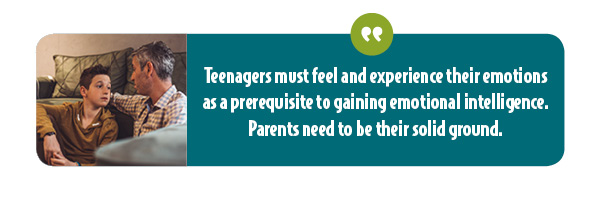Have you ever asked yourself as a parent, "What does a normal teenager act like?"
Teenage rebellion and defiance are common challenges that parents often navigate. On top of teenage push-back are social media and smartphones competing with the teen-parent connection. (Or shall I say "screen addiction"?) As a parent coach and parenting instructor, I get scores of S.O.S. calls from parents. Many parents are fearful and remark, "Where did my 'sweet child' go?!"
Estimated reading time: 6 minutes
 Heartmanity is proud to partner with outstanding companies and products that we wholeheartedly recommend, so this post may contain affiliate links. As an Amazon Associate, I earn from qualifying purchases. You can read our full disclosure here.
Heartmanity is proud to partner with outstanding companies and products that we wholeheartedly recommend, so this post may contain affiliate links. As an Amazon Associate, I earn from qualifying purchases. You can read our full disclosure here.
So, is teen rebellion normal?
And what is dramatically outside the realm of healthy development and accompanying behaviors?
Let's explore the teenage years, a parent's role, and teen brain development that affects their behavior.
The Parent's Job Is to Stay Calm and Set Firm, Healthy Boundaries
When I was teaching a parenting class years ago, a mother told the story of the time her son came home from kindergarten with green hair. She went ballistic as soon as she saw him. When I asked what triggered her anger, she replied, "All I could see was a teenager standing there with green hair, tattoos, a ring in his nose, and a chain belt hanging from his waist reeking of marijuana."
Her mind had catapulted her into an imaginary future scene, and her fear quickly set off a chain reaction. This is the power of preconceived ideas, teenage bias, and all the propaganda we hear about the teenage years!
Turns out that the green hair was left over from a Saint Patrick's Day celebration at school when the teachers dyed the children's hair using a washable dye. They pretended to be leprechauns.
Innocent enough, so why the knee-jerk reaction?
What is it about the teenage years that feels so intimidating and causes parents to react so hastily?
My husband and I noticed that whenever we mentioned we had teens, people would gasp, immediately extend their condolences, or tell us the latest horror story they had encountered personally or heard from a friend. We kept waiting for Damocles' sword to fall, but it never did.
The Misconception of Teenage Rebellion
In our culture, a belief has formed that is creating a misconception. It would appear that we are accepting hook, line, and sinker the idea that teenage rebellion is inevitable.
It's true that the teenage years are a time of massive growth in many areas, which comes with an enhanced desire for exploration and a need to test limits. It is a critical period for brain development and defining individuality. However, it's just not true that rebellion is a normal teenage state.
Instead, teenage rebellion indicates that we need greater understanding, more effective skills, and more patience.
Until recently, many believed that hormonal fluctuation, negative peer pressure, or poor parenting were the primary causes of erratic teenage behavior. However, some remarkable scientific findings offer a more encouraging explanation.

Even though 95% of brain development is completed by age 5, the most advanced parts of the brain are not completed until at least age 25. The prefrontal cortex, which is responsible for moral judgment, emotional restraint, rational decision-making, impulse control, and critical thinking, does the bulk of its maturation from ages 12 to 20.
So not only are teens growing rapidly emotionally and physically but due to extraordinary brain growth, they are literally cut off from the part of their brain that helps make good decisions!
A great parenting book to read or listen to is "Yes, Your Teen Is Crazy!" by Michael J. Bradley. The information is extremely helpful in understanding the brain development and how to respond effectively to your teen as a parent. The book received a well-deserved Parents' Choice award.

Parenting a Teenager Plays an Important Role in Teen Brain Health
We as parents and teachers can assist our young people by being loving, firm, and neutral mirrors. When we remain calm, teens are able to gain stability, increase self-awareness as well as empathy for others, and learn to moderate their emotions, desires, and impulses.
Remember that you are modeling and teaching emotional intelligence to them even when they are pushing your buttons!
The calmer we are and the more respectful our response to teenagers' behavior, the more quickly they can calm down and give mutual respect.
Parents' firm and loving calmness provides emotional safety to a rapidly developing brain on edge.

Parenting Skills to Support Your Teen and Their Brain Development
Below are vital steps for parenting teens. These actions will help your teen navigate the years safely when their brain development leaves them vulnerable to irrational behavior.
By responding effectively to a teen's erratic behavior, parents provide a loving sounding board that allows them to regroup. With this safe space, teenagers are better equipped to integrate skills and connect the dots of their behavior, making better choices in the future.
How to Handle Teenage Rebellion: Steps for Parenting Teens Successfully
Create a nonjudgmental environment in which your teen can openly discuss what's on their mind.
A good way to mute teenagers is to criticize or seek to control them. We WANT them sharing and talking with us; this is how we maintain our influence!
When we take time to listen, it allows teens to explore and discover themselves while more quickly taking ownership for their mistakes and short-sightedness. Attentive listening also shows respect, which encourages teens to express themselves more honestly and openly.

Remain calm when your teen is upset; if you can't, calm yourself before responding.
Being a stable, calm sounding board helps teens see their behavior more accurately and encourages them to self-correct. Our calmness provides a crucial foundation for teenagers to reflect on their actions and decisions with greater clarity.
This supportive presence allows them to gain a more accurate understanding of their behavior and promotes an environment where they feel safe to acknowledge their mistakes.
As a result, they are more likely to take responsibility for their actions and make necessary adjustments, promoting personal growth and maturity. By offering this steady and empathetic support, you empower teens to develop the skills needed to navigate their challenges with confidence.
However, if you react or blow up, your teen is now dealing with YOUR emotions—and just like looking into a wavy pond, they can no longer see their reflection clearly. Frequently, if a parent reacts, a teen will make it about THEIR PARENT's unreasonable behavior instead of looking at their own.
Calm and steady parenting keeps teens growing, maturing and thriving!

Apologize to your children whenever appropriate.
Not only does apologizing provide many opportunities for teaching moments for your teens, but empathetic apologies also gain trust, teach humility, and heal or strengthen the relationship in a way nothing else can.
Teenagers are alert to spot times when you're not living your values and what you've taught them. They possess a keen awareness and are quick to notice when there is a disconnect between what you profess and the actions you take. They often scrutinize whether you are genuinely practicing what you preach.
This heightened sensitivity means they are constantly evaluating the consistency between your words and deeds, and they are particularly attuned to any discrepancies. When they perceive that you are not embodying the principles you have instilled in them, it can lead to a sense of disillusionment or mistrust.
Therefore, it is crucial to model the values you wish to impart, e.g., honesty, humility, and openness, as your actions serve as a powerful example that reinforces the lessons you aim to teach.
An authentic apology can make a powerful impact when you make a parenting misstep, which we all do occasionally.

Set clear and healthy boundaries for your teen.
By setting healthy boundaries that have agreements consented to ahead of time, many conflicts are avoided. Teenagers will soon be out of the house and on their own, so it is important to involve them in making decisions and setting limits.
Giving your teen opportunities to practice skills in a safe environment will help build emotional muscles, and they will be better equipped to set limits for themselves and others. For example, when you need to set a curfew, involve your teen in the decision. Find a time that works for both you and your teen.
Typically, when freedom is given responsibly, it is respected and adhered to. Setting boundaries with teens is another way to let them know you care.

Allow plenty of space for them to be themselves without taking too much distance.
Even though teenagers are quick to push back our guidance, they still need constant love and reminders that we're always there for them. And even though youthfulness may make them feel invincible, they still look to us for direction. Many times, teen rebellion can be a cry for connection and love.
Parenting teenagers requires a focus on keeping your relationship with your teen strong and communication open.
 A strong, connected relationship will be a lifeline to them when they need support and a source of joy when they don't. No matter what the situation, it's unhelpful to label teens as rebellious. Let's create families and communities where teenagers can thrive and grow into loving, responsible, contributing members of society.
A strong, connected relationship will be a lifeline to them when they need support and a source of joy when they don't. No matter what the situation, it's unhelpful to label teens as rebellious. Let's create families and communities where teenagers can thrive and grow into loving, responsible, contributing members of society.
Recommended Parenting Books and Audios:

Parenting from the Inside Out by Daniel Siegel
If you've ever said to yourself, "I can't believe I just said that to my child!" this parenting book is for you! It explores how our own childhood impacts our parenting and gives a step-by-step approach to integrate and give meaning to those experiences. It will help you deepen your parent-child bonds as you tap into better emotion regulation and empathetic communication skills. A must-read for every parent.

Yes, Your Teen Is Crazy! by Michael J. Bradley
A profound yet humorous, award-winning book on the teenage brain and the accompanying parenting challenges. Bradley goes to the heart of the parent-teen relationship with elegance and practical tools backed by science. It's an invaluable resource for any parent who has preteens or teens!
 Raising a Thinking Preteen by Myrna B. Shure, Ph.D.
Raising a Thinking Preteen by Myrna B. Shure, Ph.D.
In this bestseller, you'll get a practical guide to teach your preteen how to think independently at a time when their brain is rapidly developing and peer pressure increases. It is written with insight, boiling down academic research into user-friendly information for parents to easily apply. Shure addresses the adolescent challenges with a nationally acclaimed method for resolving conflict and practical tools for success. Learn how to build the resilience your child needs—an incredibly vital book for every parent!
For additional reading, please see our article, "Redirecting Teen Defiance into Healthy Self-Esteem."
For parent coaching and support, contact us now or check out our parenting class on "Hacking the Teen Brain."









